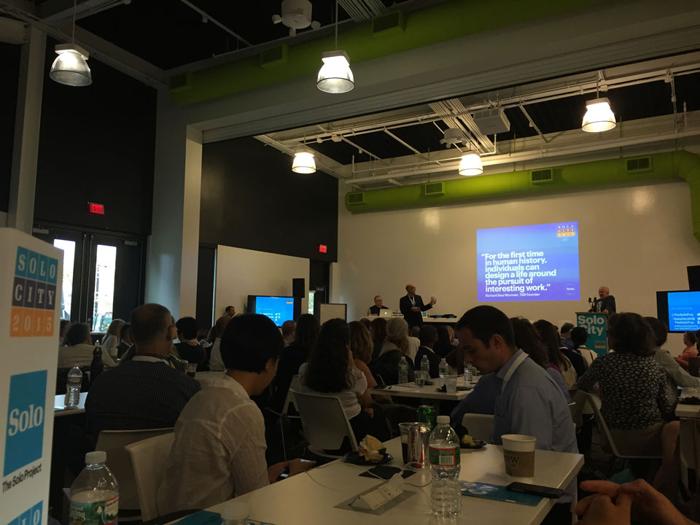From: http://www.boston.com/
Chris Bowers, a 23-year-old graphic designer, was just one of the hundreds of freelancers milling about Boston’s District Hall Thursday, hoping to learn more about the Solo Project, a research initiative aimed at kick starting a national conversation about the growing number of independent workers.
After attending the Massachusetts College of Art and Design, Bowers said he was struggling to find a good studio fit. It’s not that there weren’t job openings, he explained, it’s that most studios in Boston were doing advertising and he wanted to do more community-focused work.
“I have the luxury of choice,” Bowers said. But still, it’s been a struggle for him to market his work independently. “Most of my jobs have come from internships I’ve had,” Bowers said.
He didn’t know exactly what he hoped to get from the “Solo City” event, but he planned on networking and expanding his contact list. Seated at his table were self-employed business consultants, market analysts, accountants, and web designers. Some were also in their early-20s, while others were in their 40s and 50s.
Like many of the other free agents at the event, Bowers is the perfect candidate for the Solo Project. Based in Boston, the media and research company is the brainchild of Fast Company and Inc. Magazine founders George Gendron, Michael Hopkins, and Patrick Mitchell who want to empower solo workers through networking opportunities and better urban infrastructure.
Gendron, who kicked off the town hall event, said it’s hard to measure the number of freelancers in the U.S., but the number is growing. Somesurveys estimate that about 53 million Americans, or a third of the U.S. workforce, are solo workers.
“It’s not for the faint of heart,” Gendron said. “I’m married to an accomplished soloist, and the anxiety never goes away.” There’s the stress of finding the next gig, getting paid on time (or at all), and managing time wisely. “That’s why we’re launching the Solo Project,” he continued.
After partnering with the Knight Foundation, a nonprofit dedicated to supporting quality journalism, the Solo Project leaders conducted 40 in-depth interviews with prominent technologists, business and education leaders, policy makers, and successful entrepreneurs to better understand what independent workers need. Gendron said the subsequent town hall’s purpose was for the city’s soloists to swap ideas about how to sustain the freelancer lifestyle and shape the “solo city of the future.”
The event included a real-time poll that allowed attendees to respond to questions via text like, “Which of these offices would you prefer working in?” and “At what age did you start working independently?”
Gendron said the responses would be collected and used in a report co-published by The Solo Project and the Knight Foundation this fall, to be distributed via multiple channels, including directly to the city of Boston and nearby businesses and universities.
The event also featured speakers like Paige Arnof-Fenn, builder of global marketing firm Mavens & Moguls, and Miro Kazakoff, an MIT lecturer and co-founder of Testive, a test prep program for students. They explained the realities of sales and marketing for soloists, and discussed strategies for self-management.
“Our economy generates lots and lots of work and less often it’s packaged as jobs, but as projects,” Gendron said. “We’re not prepared for that as a culture. We’ve been preparing people for a world that doesn’t exist anymore. We need the infrastructure to help people thrive as independent workers.”








Leave a Reply
You must be logged in to post a comment.